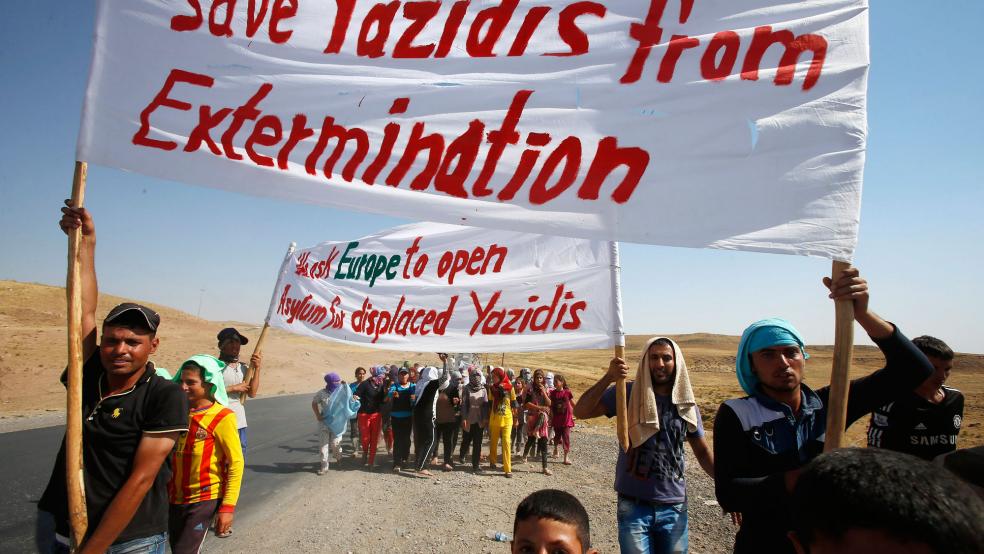The arrival of U.S. troops at Mt. Sinjar, where American airstrikes have broken a siege of Iraqi Yazidis and Christians by International State of Syria and Iraq, marks a dramatic escalation of American involvement in the fight for the future of Iraq. For the first time since ISIS advanced toward the outskirts of Baghdad, American troops were in a combat zone where their lives were directly as risk from the ISIS threat.
The first hint that President Obama was considering more than airstrikes to help the stranded Yazidi refugees came Tuesday, when State Department spokeswoman Marie Harf said that the president was considering creating a “humanitarian corridor” to get refugees off Mount Sinjar. Sen. Diane Feinstein then asked United Nations Secretary-General Ban Ki-moon to help create the corridor.
Related: With Iraq in Ruins, ISIS Turns to Genocide
Prior to Wednesday, it was not clear that airstrikes alone would be able to end the ISIS siege and create this corridor. Given this lack of knowledge, it was unsurprising when administration officials told The New York Times that a Special Forces team had already landed on the mountain and were considering options to rescue the Yazidi.
White House spokesman Benjamin Rhodes said that the president still is against using American troops in a combat role in Iraq.
“What he’s ruled out is reintroducing U.S. forces into combat on the ground in Iraq,” Rhodes said.
Rhodes added that American troops would be able to defend themselves if they came under attack. He said that the president was waiting to hear from the Pentagon, which was debating how to proceed.
Related: How Iraq's Army Lost So Much Ground to ISIS So Quickly
By the end of the day in Washington, DOD reported that the American airstrikes had done the job: there were far fewer refugees than previously thought, and ISIS was no longer surrounding the mountain. The siege is over.
“The Yazidis who remain are in better condition than previously believed and continue to have access to the food and water that we have dropped," the statement read. "Based on this assessment the interagency [team] has determined that an evacuation mission is far less likely."
The Pentagon also reported that the Kurdish Peshmerga, which had been pushed back by ISIS last week, had rebounded and made advances against the group.
The end of the Mount Sinjar siege is a great outcome for Iraqis and a key moment in the fight against ISIS. It’s the first time ISIS has been turned back in a manner that caught the attention of the world. The group no longer appears to be invincible.
Related: Why the Long Arm of ISIS Has Eric Holder Spooked
It remains to be seen if the end of American airstrikes would coincide with the end of the siege. If the group is as powerful as many in Congress and the White House suggest, this is not the end of the fight.
However, it does mark a significant point in the battle for Iraq for the U.S. military. Obama’s decision to send more U.S. troops is indicative of the slippery slope he’s on in Iraq. He’s gone from refusing to help to sending military advisers to airstrikes in the course of a few months. The arrival of advisers in locations that puts them in harms’ way is another step in the president’s evolution.
If the trend holds, the next step would be American troops engaging in combat with ISIS. This is something neither the president nor the American people want.
Top Reads from The Fiscal Times





